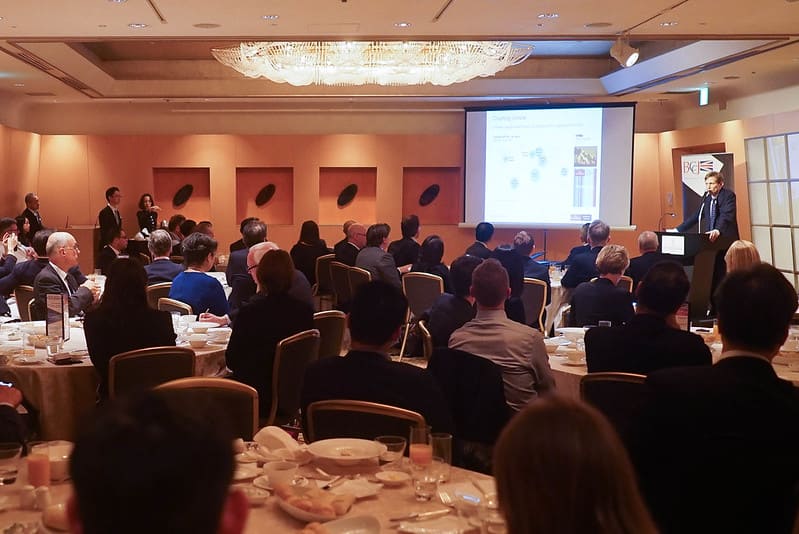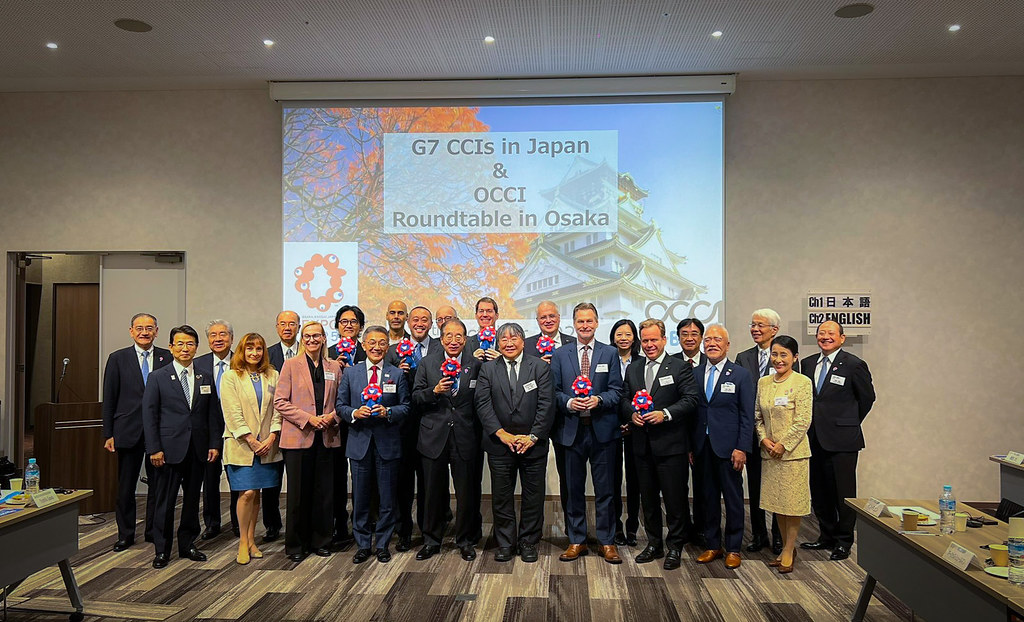Member? Please login
Global Forecast 2020

Written by Sterling Content
February 10, 2020
Past Event Round Ups
With a slowdown of world trade, strained US–China relations and the outbreak of Wuhan novel coronavirus, 2020 presents challenges to the global economy, but the Olympics and Paralympics offer solace to Japan.
That was the main takeaway from Dimitry Rakin, associate director of The Economist Corporate Network (ECN), who delivered a 2020 Global Forecast to BCCJ members and guests at a BCCJ luncheon on January 30.
Rakin said many of the issues that impacted the world in 2019 would continue to play out throughout this year and beyond. He cited Trumponomics (the economic policies of US President Donald Trump), Slowbalisation (the decline of the global economy) and climate change as notable examples.
The world’s economy, he said, is forecast to grow by a mere 2.3% in 2020, an “undramatic growth rate” due to the slowdown of many countries’ economies. Japan is one such country, with this year’s economic growth rate expected to be the lowest in six years.
The shrinkage of the global economy is being exacerbated by climate change, which is expected to result in losses amounting to 3% of global GDP in 2050. Rakin called on every country and business to be prepared, as no region would escape the impact of climate change on their economy.
However, steps to stem the damage are encouraging. He noted that organisations are increasingly viewing green initiatives not as a PR or cost-cutting measures, but “an opportunity to become more profitable through developing sustainable ways of doing business.” With this goal in mind and, encouraged by consumer pressure, the business community is moving faster and pursuing more progressive agendas on sustainability than policymakers, he added.
Risks to the global economy
As the second-largest economy in the world, China dominates the risks for the global economy this year.
The Wuhan novel coronavirus, which originated in China’s Hubei province, could be a black swan event with extreme consequences. According to the ECN, the outbreak could reduce China’s real GDP growth this year by 0.5–1.5%. At 1% growth, the global economy would lose 0.1–0.2% of potential growth and a prolonged outbreak would lead to a recession in Japan.
Rakin predicts the economy of both China and Japan will be hit harder by the coronavirus that they were by SARS, which appeared in China’s Guangdong province in February 2003 and lasted about six months.
“The Chinese economy lost 6–7% of quarterly GDP growth in 2002–03 but recovered quickly because the economy was different. Now domestic consumption loss will hit the economy harder,” he said. “In the past 20 years, the importance of China’s economy has been growing, especially for Japan. There has already been an impact (from the coronavirus) on Japan’s travel and tourism. Next to be hit will be Japan’s manufacturing and consumer industries.”
In trade, US–China tensions are expected to continue in 2020 and beyond, despite the conclusion of the first phase of a bilateral deal in January. He attributes this to the shallowness of the agreement and the “high risk” that it will fall apart during implementation plans.
The US administration, he added, “is likely to pursue a similar approach to China” regardless of who wins the presidential race in November. He also said the new president would have a big impact on the economy.
Other global risks in 2020 include frosty relations between Japan and South Korea, which has seen South Korean exports to Japan fall by 6% and imports from Japan fall by 12.9% last year. While Brexit is forecast to be potentially a major risk for the UK and EU, it was not classified as high risk for the global economy.
Japan: challenges and opportunities
With Shinzo Abe becoming the longest consecutively serving prime minister in Japanese history in 2020, Japan is “enjoying stability,” said Rakin.
This year, the country is forecast to see 0.4% GDP growth. It’s a drop of 0.4% year on year and the lowest economic growth rate in Japan in the past six years, which he attributes to depressed spending as a result of the consumption tax hike in October 2019. Still, Japan is expected to bounce back, with 0.9% growth in 2021 and 1.1% growth in 2022.
“There’s a lot of pessimism about Japan’s economy because of its declining population, but GDP per head shows Japan to have similar economic growth to that of the US. In the past few years the US has been enjoying stable economic growth, so Japan’s economy is not in bad shape either,” he said.
He pointed out that although Japan faces a greying population, labour shortage, high gender gap and comparatively low level of innovation in digital technology, these issues could be considered opportunities as much as challenges. As Japan is among the first in the world to face these issues, there is huge potential to drive innovation by tackling them.
“Japan can show how to lead,” he said, pointing out that the country’s manufacturing sector has a very high level of automation potential and national GDP could be increased by 15% if women’s potential can be utilised.
Inbound tourism, too, can be developed further. Though he said the sector’s consistent two-digit rate of growth for the past five years is “impressive,” Japan lags behind France, the UK and the US in the rate of tourism contribution to GDP.
Rakin forecasts Tokyo 2020 will advance Japan’s tourism industry in the short and long-term and provide a much-needed boost to the country.
“Japan is gaining greater international exposure thanks to global sporting events,” he said, citing the 2019 Rugby World Cup and Tokyo 2020. “Japan is coming back on the world’s agenda.”

Though Japan may not hit its target of 40 million visitors this year due to fallout from the coronavirus, he predicts that the Games will help increase international arrivals in Q3 and Q4.
“The Olympics may not be the saviour for GDP growth in Japan, but it will help,” he said, pointing out that the feel-good factor of hosting the Games will inject positivity into Japan. “Consumer confidence is low in Japan at present and the stimulus of the Games will have a positive effect on the economy as a whole,” he said. “Companies need to capture this positive momentum and use it as a driver for business.”







